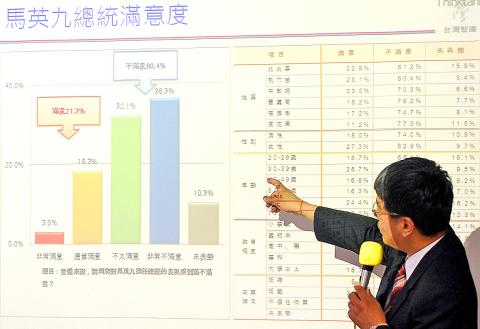On the eve of the final year of President Ma Ying-jeou’s (馬英九) second four-year term today, Ma’s disapproval rating stood at nearly 70 percent or higher in various surveys, while his approval rating was as low as less than 20 percent.
About 68.4 percent of respondents were dissatisfied with Ma’s performance as president, against 21.3 percent who said they were satisfied, in a telephone-based poll conducted on Sunday, Taiwan Thinktank said yesterday.
A cross-analysis of differences in political party affiliation found that among respondents who identified themselves as supporters of the pan-blue camp, 50.5 percent said they found Ma’s governance dissatisfactory, the poll showed.

Photo: Chen Chih-chu, Taipei Times
The survey found 49.1 percent of respondents doubted the image Ma has sought to establish as a clean politician because they said they believed there might have been some irregularities involving Ma in his handling of the Taipei Dome project when he was Taipei mayor, while 29.2 percent believed he was clean.
The president has repeatedly stressed that only by respecting the so-called “1992 consensus” — an alleged agreement between the Chinese Nationalist Party (KMT) and the Chinese Communist Party that there is “one China, with each side having its own interpretation of what ‘one China’” means” — can the “status quo” be maintained, but the survey found that a majority of people did not agree.
According to the survey, 68.7 percent of the public said they support maintaining the “status quo,” while only 15.4 percent said they support the “1992 consensus.”
KMT Chairman and New Taipei City Mayor Eric Chu’s (朱立倫) description of cross-strait relations as “both sides belonging to one China,” to which Ma has given his endorsement, was supported by only 13 percent of respondents, while 77.4 percent said Taiwan and China are both sovereign states, independent of each other and not subordinate to the other, the survey found.
About 50.2 percent of respondents said the government should place more consideration on the impact of cross-strait exchanges and negotiations on national security, while 38.1 percent said economic benefits should be the main concern, the poll showed.
On a scale of zero to 10, with zero indicating “not at all” and 10 signifying “extremely,” the extent to which respondents perceived Taiwan as depending on China to maintain its economic growth stood at 6.1. Moreover, 62.2 percent of respondents said Taiwan should deepen its economic ties with countries other than China.
A survey that the Chinese-language Liberty Times (the sister paper of the Taipei Times) conducted from Saturday to Monday found that 14.52 percent of respondents said they were satisfied with Ma’s performance over the past seven years, against 64.3 percent who thought the opposite.
Similar results were found in a survey released by the TVBS poll center yesterday showing Ma’s approval rating at 16 percent and disapproval rating at 67 percent.
In another poll, conducted by Taiwan Indicators Survey Research, 15.4 percent expressed satisfaction with Ma, while 75.7 percent were dissatisfied.
Additional reporting by Shih Hsiu-chuan

INVESTIGATION: The case is the latest instance of a DPP figure being implicated in an espionage network accused of allegedly leaking information to Chinese intelligence Democratic Progressive Party (DPP) member Ho Jen-chieh (何仁傑) was detained and held incommunicado yesterday on suspicion of spying for China during his tenure as assistant to then-minister of foreign affairs Joseph Wu (吳釗燮). The Taipei District Prosecutors’ Office said Ho was implicated during its investigation into alleged spying activities by former Presidential Office consultant Wu Shang-yu (吳尚雨). Prosecutors said there is reason to believe Ho breached the National Security Act (國家安全法) by leaking classified Ministry of Foreign Affairs information to Chinese intelligence. Following interrogation, prosecutors petitioned the Taipei District Court to detain Ho, citing concerns over potential collusion or tampering of evidence. The

TRADE: The premier pledged safeguards on ‘Made in Taiwan’ labeling, anti-dumping measures and stricter export controls to strengthen its position in trade talks Products labeled “made in Taiwan” must be genuinely made in Taiwan, Premier Cho Jung-tai (卓榮泰) said yesterday, vowing to enforce strict safeguards against “origin laundering” and initiate anti-dumping investigations to prevent China dumping its products in Taiwan. Cho made the remarks in a discussion session with representatives from industries in Kaohsiung. In response to the US government’s recent announcement of “reciprocal” tariffs on its trading partners, President William Lai (賴清德) and Cho last week began a series of consultations with industry leaders nationwide to gather feedback and address concerns. Taiwanese and US officials held a videoconference on Friday evening to discuss the

NEGOTIATIONS: The US response to the countermeasures and plans Taiwan presented has been positive, including boosting procurement and investment, the president said Taiwan is included in the first group for trade negotiations with the US, President William Lai (賴清德) said yesterday, as he seeks to shield Taiwanese exporters from a 32 percent tariff. In Washington, US Trade Representative Jamieson Greer said in an interview on Fox News on Thursday that he would speak to his Taiwanese and Israeli counterparts yesterday about tariffs after holding a long discussion with the Vietnamese earlier. US President Donald Trump on Wednesday postponed punishing levies on multiple trade partners, including Taiwan, for three months after trillions of US dollars were wiped off global markets. He has maintained a 10 percent

PERSONAL DATA: The implicated KMT members allegedly compiled their petitions by copying names from party lists without the consent of the people concerned Judicial authorities searched six locations yesterday and questioned six people, including one elderly Chinese Nationalist Party (KMT) member and five KMT Youth League associates, about alleged signature forgery and fraud relating to their recall efforts against two Democratic Progressive Party (DPP) legislators. After launching a probe into alleged signature forgery and related fraud in the KMT’s recall effort, prosecutors received a number of complaints, including about one petition that had 1,748 signatures of voters whose family members said they had already passed away, and also voters who said they did not approve the use of their name, Taipei Deputy Chief Prosecutor